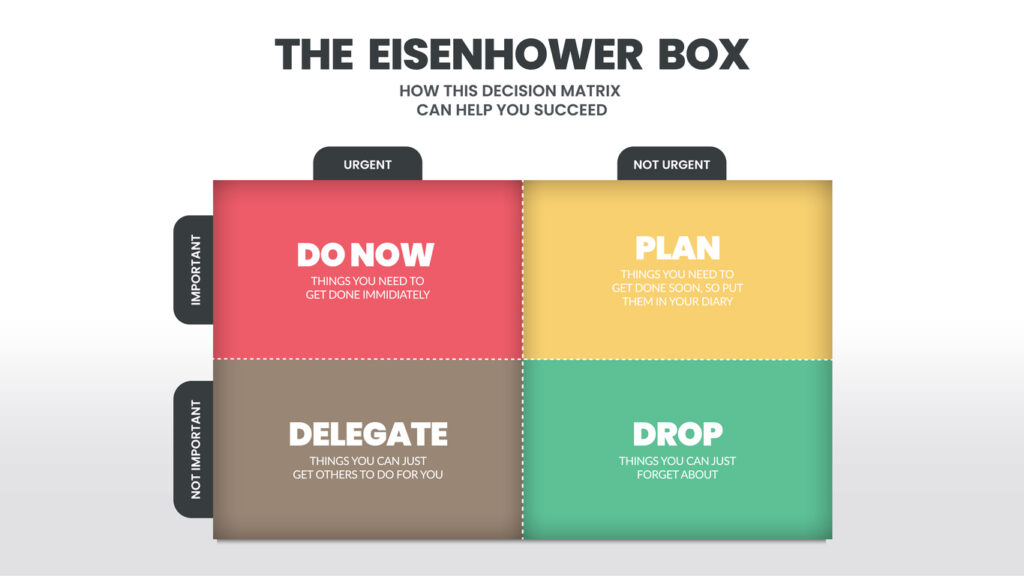
Have you ever been accused of being a “gatekeeper”? asks Helen Achilleos
Most executives believe a good gatekeeper is worth their weight in gold. So what is gatekeeping all about?
Open Communication
In any business open communication is important. It gives senior management the opportunity to hear first-hand what’s going on in their business. It’s good for morale when staff feel they are being listened to and have a relationship with their senior management team.
Time Management
So is gatekeeping about blocking access and stopping the communication flow as some suggest? Or is it about scheduling, prioritising, good planning and effective time management? Good time management is about spending time on what is “important”.
When scheduling time for our executives we spend our time in one of four ways:

Effective people stay out of quadrants 3 and 4 because whether their matter is urgent or not, they understand that it is “NOT important”. Ineffective people spend most of their time reacting to things believing they are important. The urgency of this is often based on the priorities and expectations of others. Efficiency is doing things right, effectiveness is doing the right things.
Priority goals
Urgent matters are visible. We “react” to urgent matters. They require immediate action. The Important quadrants have more to do with results, your mission, your values and your high-priority goals. Important matters that are not urgent require more initiative and more proactivity.
The reality is that the more senior the executive, the more people will want to see them. So is it reasonable to believe that your executive will always be available without their time being scheduled?
Putting aside commitments that may be more urgent and important to tend to the squeaky wheel that keeps knocking on the door is not a good use of time. Yet a lot of executives get caught up looking after the “trivial many” rather than the “vital few” because these are the ones that come knocking on the door or yell the loudest. “Things that matter most must never be at the mercy of things that matter least”
The Gatekeeper’s Role
It is our role to manage that schedule at our executive’s discretion. Crucial to successfully managing someone’s diary is having the Assistant and the executive in lockstep with each other so they can back you up when needed. We need to be that important link that protects our boss from non-urgent, unimportant interruptions so that important matters are given priority.
Time at face value?
Imagine that your executive has just returned from two weeks of annual leave. They will need time to play catch-up. You’ll free up time for them when they are back in the office for that purpose. Or imagine if they have been off-site at a client meeting and you know there is a possibility it will take longer than expected and that travel and traffic needs to be factored in. Imagine they have been in meetings all day long and an important matter needs to be brought to their attention. Unfortunately, they have people queuing at their door. Back-to-back meetings with no breaks can ruin the day and create a backlog.
In between meetings is when they need to have time to respond to emails, return telephone calls, prepare for meetings, attend to action items from previous meetings, research questions that have been asked of them, compile reports, and the 101 other activities expected of a busy executive. They also need to have time to eat, grab a coffee and go to the toilet (they are only human after all).
Juggling all of this is an important responsibility and as their Assistant, it’s our job to manage their schedule and take charge. The reality is that the less skilful our executive is at managing down, the more skilful an Assistant needs to be at managing up. Having meetings scheduled through us allows us to prioritise accordingly.
Take control
As an Assistant, we know when our executive is overloaded. We know when people are beating them up or chasing things that they haven’t had time to do. We know when they are having a difficult meeting or when they are becoming stressed, tired and grumpy often before they do and we schedule and prioritise accordingly. Whilst our executive is busy looking after all the people that work for them, someone has to look after the executive… and that is what we do.
Most people understand that senior executives spend a large portion of their day in meetings so they are not always around for that unplanned “drop by” chat and they don’t take it personally when the executive is busy.
People quickly learn that they need to plan ahead if a deadline is looming and they need input into a decision or a signoff. And this is where an Assistant can help in that we can set the expectation of when our executive will be available and we can ensure that important matters are brought to their attention as soon as possible. People quickly learn that going through us could be used to their advantage.
As mentioned previously, the key to mastering this skill is to ensure you are in lockstep with your executive.
Meeting regularly (1 to 1 each day) to discuss issues, priorities and scheduling conflicts is of prime importance. Encourage your executive to share their motives, pressures, and concerns. This will provide you with invaluable information so that when you head back to your desk and set up meetings, you know how to prioritise and make informed decisions.
The key to a successful partnership is communication, empathy, mutual respect, trust and loyalty.













